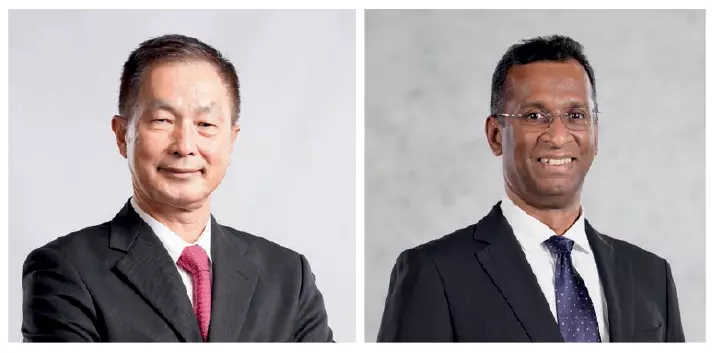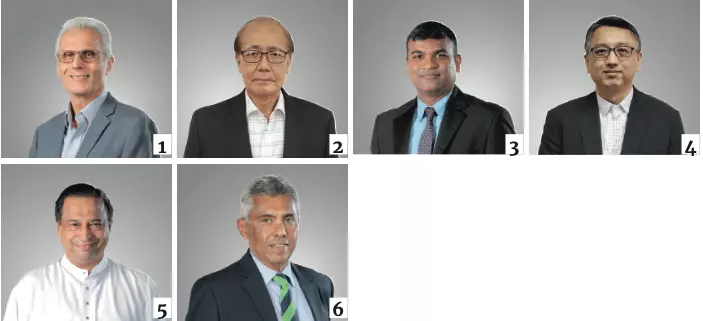
The largest Textile Group and Knit Fabric Provider in South Asia and Sri Lanka’s only multinational mill delivers satisfactory results.
People powered performance
The Teejay Group recorded a Net Profit of Rs.2.1 billion, maintaining the Rs. 2 billion plus Bottomline from the previous year while recording a Topline of Rs. 31.7 billion for the year. One of the key factors for Group profitability during consideration was the favorable yarn prices due to demand reduction. Group Revenue was recorded at Rs. 31.7 billion for the year, marking a decline of 4.5%. In contrast, Profit was recorded at Rs. 2.1 billion, a 10.4% decline over the previous year, mainly due to the closure of plants and less delivery output in Quarter One. Teejay Lanka recorded a Revenue of Rs. 21 billion, reflecting an 8.3% year-on-year growth. The Company posted Profit after Tax of Rs. 1.9 billion, reflecting a year-on-year decline of 1.3%.
Expansion in Teejay India
Despite the pandemic in the background, the Teejay Group had many positive developments to celebrate – such as embarking on Teejay India’s expansion project in the year under review. The USD 26 million project is anticipated to increase the daily capacity of the Teejay India plant by 20 tonnes, thereby enhancing output to 55 tonnes in daily capacity. The utilization of expanded capacity began production during Financial Year 2021/22, and full capacity utilization will begin during Financial Year 2022/23.
The project was embarked upon as a response to the growth in the global retail apparel market and businesses shifting to the South-East Asia region. The plant will have flexible knitting machines converting cotton to the synthetic fabric as we believe the demand for synthetics is poised to expand by leaps and bounds.
The journey towards becoming a USD 300 million Company
Teejay continues with expansion projects to reach its target of becoming a USD 300 million Company. The Company has also invested in an innovation hub to propel the development of new innovative fabrics to revolutionize the fabric industry. Teejay also mitigates the future capacity risk by partnering with a few outsourced parties within Sri Lanka to fulfill demand.
With innovation at heart
Teejay will continue to upgrade its product portfolio with value addition by entering into joint venture projects with other brands on their innovation journey and R&D efforts on the product development and innovation side.
During the year under review, Teejay Lanka invested in a brand-new Innovation Center geared to develop new, innovative fabrics. The thrust at the Center will be on designing sustainable products, which positively impact the environment.
Teejay is increasing production capacity and internal capabilities in Sri Lanka by modernizing technical machinery for dyeing and printing processes. Highly experienced team members have been recruited to lead this effort to meet evolving customer demands. While increasing production, Teejay is managing water consumption and effluents to meet the highest environmental standards.
Environmental and social commitment
While designing sustainable products, Teejay also reduces its carbon footprint by monitoring Green House Gas (GHG) emissions, energy and water consumption, and waste management from its production processes.
The Company also engaged in sustainability initiatives with partner brands and submitted all 3 of its facilities for carbon footprint assessment. During the year under review, Teejay Lanka improved its position on the HIGG FEM (Facility Environmental Module) Index, scoring 77%, which reflects a 5+ improvement over the previous year.

Wing Tak Bill Lam
Chairman/Independent Non-Executive Director
Pubudu De Silva
Group Chief Executive Officer
1. Ashroff Omar
Non-Executive Director
2. Wai Loi Wan
Non-Executive Director
3. Hasitha Premaratne
Non-Executive Director
4. Kit Vai Tou
Non-Executive Director
5. Prof Malik Kumar Ranasinghe
Independent Non-Executive Director
6. Amitha Gooneratne
Independent Non-Executive Director





